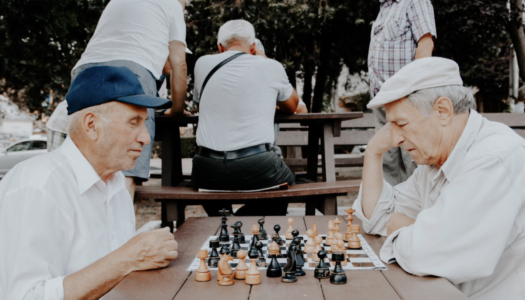This simple activity can prevent the risk of Dementia—Are you doing it?
- Replies 0
As we gracefully navigate our golden years, the risk of cognitive decline often grows. Many of us are all too aware of the importance of keeping our minds sharp and our memories intact.
It's a topic that's close to our hearts, and we're always on the lookout for ways to protect our mental health.
In a recent study, researchers at Rush University Medical Center followed 1,923 older adults who were initially free of dementia, conducting annual check-ins to assess their social activity levels and cognitive health.

Staying social can be good for your brain, A new study found that people who regularly connected with others had a much lower chance of developing dementia or mild cognitive impairment. Over nearly seven years, researchers followed a group of people and discovered that those who were more socially engaged were significantly less likely to experience these cognitive issues.
The type of social activity didn't seem to matter—it could be anything from dining out with friends to attending religious services or simply sharing a joke with your old friends, the mental gymnastics involved in the conversation are invaluable for maintaining cognitive health.
The findings were explained by Dr. Bryan James, associate professor of internal medicine at Rush University Medical Center, in a press release.
“This study follows up on previous research showing that social activity is related to slower cognitive decline in older adults,” James stated. “In this study, we show that social activity is associated with a decreased risk of developing dementia and mild cognitive impairment.
The least socially active older adults developed dementia an average of five years earlier than the most socially active individuals.”
Additionally, a five-year delay in dementia onset is estimated to add about three years to life expectancy.
Social activity was measured using a questionnaire that tracked how frequently participants engaged in six common social activities.
These included visiting restaurants, attending sporting events, playing bingo, taking day or overnight trips, doing volunteer work, or spending time with friends and family.
While the exact reason socializing plays a protective role in brain health is not fully understood, researchers have some theories.
James suggested: “One possibility is that social activity challenges older adults to engage in complex interpersonal interactions, which could help maintain efficient neural networks—a case of ‘use it or lose it.’”
Staying socially active is not just about having fun, it's a vital part of maintaining our cognitive health. So, let's embrace the opportunities to connect with others.

We'd love to hear from you. How do you stay socially active? Have you noticed a difference in your cognitive abilities when you're more socially engaged? Share your experiences and tips in the comments below!
It's a topic that's close to our hearts, and we're always on the lookout for ways to protect our mental health.
In a recent study, researchers at Rush University Medical Center followed 1,923 older adults who were initially free of dementia, conducting annual check-ins to assess their social activity levels and cognitive health.

According to the study, socializing can massively reduce the risk of dementia. Image Source: Unsplash
Staying social can be good for your brain, A new study found that people who regularly connected with others had a much lower chance of developing dementia or mild cognitive impairment. Over nearly seven years, researchers followed a group of people and discovered that those who were more socially engaged were significantly less likely to experience these cognitive issues.
The type of social activity didn't seem to matter—it could be anything from dining out with friends to attending religious services or simply sharing a joke with your old friends, the mental gymnastics involved in the conversation are invaluable for maintaining cognitive health.
The findings were explained by Dr. Bryan James, associate professor of internal medicine at Rush University Medical Center, in a press release.
“This study follows up on previous research showing that social activity is related to slower cognitive decline in older adults,” James stated. “In this study, we show that social activity is associated with a decreased risk of developing dementia and mild cognitive impairment.
The least socially active older adults developed dementia an average of five years earlier than the most socially active individuals.”
Additionally, a five-year delay in dementia onset is estimated to add about three years to life expectancy.
Social activity was measured using a questionnaire that tracked how frequently participants engaged in six common social activities.
These included visiting restaurants, attending sporting events, playing bingo, taking day or overnight trips, doing volunteer work, or spending time with friends and family.
While the exact reason socializing plays a protective role in brain health is not fully understood, researchers have some theories.
James suggested: “One possibility is that social activity challenges older adults to engage in complex interpersonal interactions, which could help maintain efficient neural networks—a case of ‘use it or lose it.’”
Staying socially active is not just about having fun, it's a vital part of maintaining our cognitive health. So, let's embrace the opportunities to connect with others.
Key Takeaways
- Researchers from Rush University Medical Center have found that regular social activity can delay the onset of dementia by 5 years and reduce the risk by 38%.
- The study involved monitoring the cognitive health of 1,923 older adults over nearly seven years, during which 545 participants developed dementia.
- Frequent social activities such as dining out, attending religious services, or maintaining connections with others could contribute to lower chances of dementia.
- The findings imply that engaging in social activities might preserve cognitive abilities, possibly by challenging the brain and maintaining efficient neural networks.
We'd love to hear from you. How do you stay socially active? Have you noticed a difference in your cognitive abilities when you're more socially engaged? Share your experiences and tips in the comments below!






